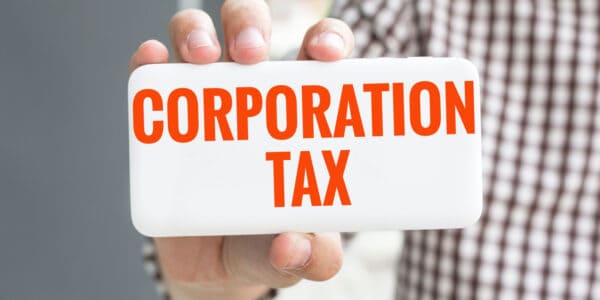Most company startup costs are tax deductible, but the cost of company formation itself cannot be claimed against Corporation Tax. The fee for setting up a limited company is classed as a one-off capital expense, so you can’t claim tax relief through your company on this particular cost.
However, as a company director and shareholder, you can reimburse yourself for any legitimate business expenses that you pay for personally, including the company formation fee. You don’t have to pay Income Tax or National Insurance on these reimbursed expenses.
So, let’s take a look at this in more detail to understand exactly which company startup costs are tax deductible through a UK limited company.
Company startup costs you can claim
When your company starts trading, you can claim Corporation Tax relief on pre-trading expenses incurred “wholly and exclusively for the purposes of the trade.”
Better still, this relief extends to expenses from up to 7 years before the date you start trading. All such allowable expenses are treated as if they were incurred on the first day of business.
The types of pre-trading costs that are tax deductible include:
- Professional fees, e.g. accountants and solicitors
- Business insurance policies, e.g. public liability, professional indemnity
- Domain names and websites
- Overheads – business premises, phone bills, broadband, and utilities
- Office supplies and stationery
- Equipment, machinery, stock, and raw materials
- Computer software
- Business travel and accommodation, e.g. visiting potential clients and suppliers
- Advertising, marketing, and PR
To offset these expenses against your Corporation Tax liability, you will need to deduct the costs from your turnover when preparing your annual accounts and Company Tax Return.
If you incur any pre-trading expenses before setting up a company, you will have to pay for these costs with your own money. This is unavoidable, because you can’t set up a business bank account in your company name before officially registering your company.
In such instances, you can claim reimbursement expenses from your company after it has been set up. You won’t have any personal tax liability as a result of these expenses.
Company startup costs you can’t claim
There are certain company startup costs that you can’t claim. These are known as ‘disallowable expenses’ for Corporation Tax and include:
- Company formation fees
- Providing entertainment (e.g. dinner) for clients, whether existing or prospective
- Clothing, apart from protective wear that is necessary for you to do your job
- Certain types of legal fees
- Fines and penalties
Whilst the cost of company formation cannot be offset against your Corporation Tax liability, you can claim expenses as a director once your company has been formed.
This means that you can reimburse yourself for business costs that you’ve paid for personally – but only if you keep receipts and meticulous records to back up your claims.
If any expenses have both business and personal elements to their use, only the business portion is tax deductible. This applies to Corporation Tax and VAT.
Company expenses and record-keeping can be complicated and there are a number of grey areas. We would advise speaking to an accountant if your business costs are significant or you’re unsure about what you can and cannot claim.
Paying accountancy fees may seem like an expense you’d rather avoid – but more often than not, hiring an accountant can save you a great deal of time and money.
Reclaiming VAT on company startup costs
If you register your company for VAT, you may also be able to reclaim the VAT paid on goods and services bought for business purposes – including pre-trading expenses.
However, the time limit for claiming VAT refunds is slightly different. From your VAT registration date, you can backdate claims up to:
- 4 years for goods that you still have
- 6 months for services
If any purchases are used for both business and private use, you can only reclaim the proportion of VAT that relates to business use.
VAT registration is available to all sizes of businesses – even small companies whose turnover is below the VAT registration threshold. This offers a number of benefits, so it’s worth considering voluntary VAT registration as soon as your company is up and running.
Keeping receipts and accurate records
To claim Corporation Tax relief and reclaim VAT on pre-trading costs, you must keep receipts and accurate accounting records of all expenses to support your claims. These must be retained for a period of 6 years after the end of the accounting period in which they are claimed.
If HMRC needs to check your Company Tax Return or VAT Returns for any reason and you’re unable to produce the required receipts and records, you could end up in hot water. This may lead to financial penalties and a rejection of the expenses claimed.
Final thoughts…
Limited company expenses and tax reliefs can be confusing for new business owners – namely, which costs are legitimately tax deductible. It’s important to operate your business honestly and lawfully, but you don’t want to pay more tax than you have to.
As we’ve explained, many company startup costs can be offset against your Corporation Tax bill, and you can reclaim VAT paid on certain startup expenses as well. But the cost of company formation itself is not one such expense. Instead, you’ll need to pay for this personally and reimburse yourself through the company bank account.
We hope that this post has been helpful and shed some light on this topic. However, we do recommend consulting an accountant or tax advisor for specialist advice and assistance with your business expenses and accounting needs.
If you have any questions or need help setting up a company, please contact our company formation team or leave a comment below.
Please note that the information provided in this article is for general informational purposes only and does not constitute legal, tax, or professional advice. While our aim is that the content is accurate and up to date, it should not be relied upon as a substitute for tailored advice from qualified professionals. We strongly recommend that you seek independent legal and tax advice specific to your circumstances before acting on any information contained in this article. We accept no responsibility or liability for any loss or damage that may result from your reliance on the information provided in this article. Use of the information contained in this article is entirely at your own risk.






Join The Discussion